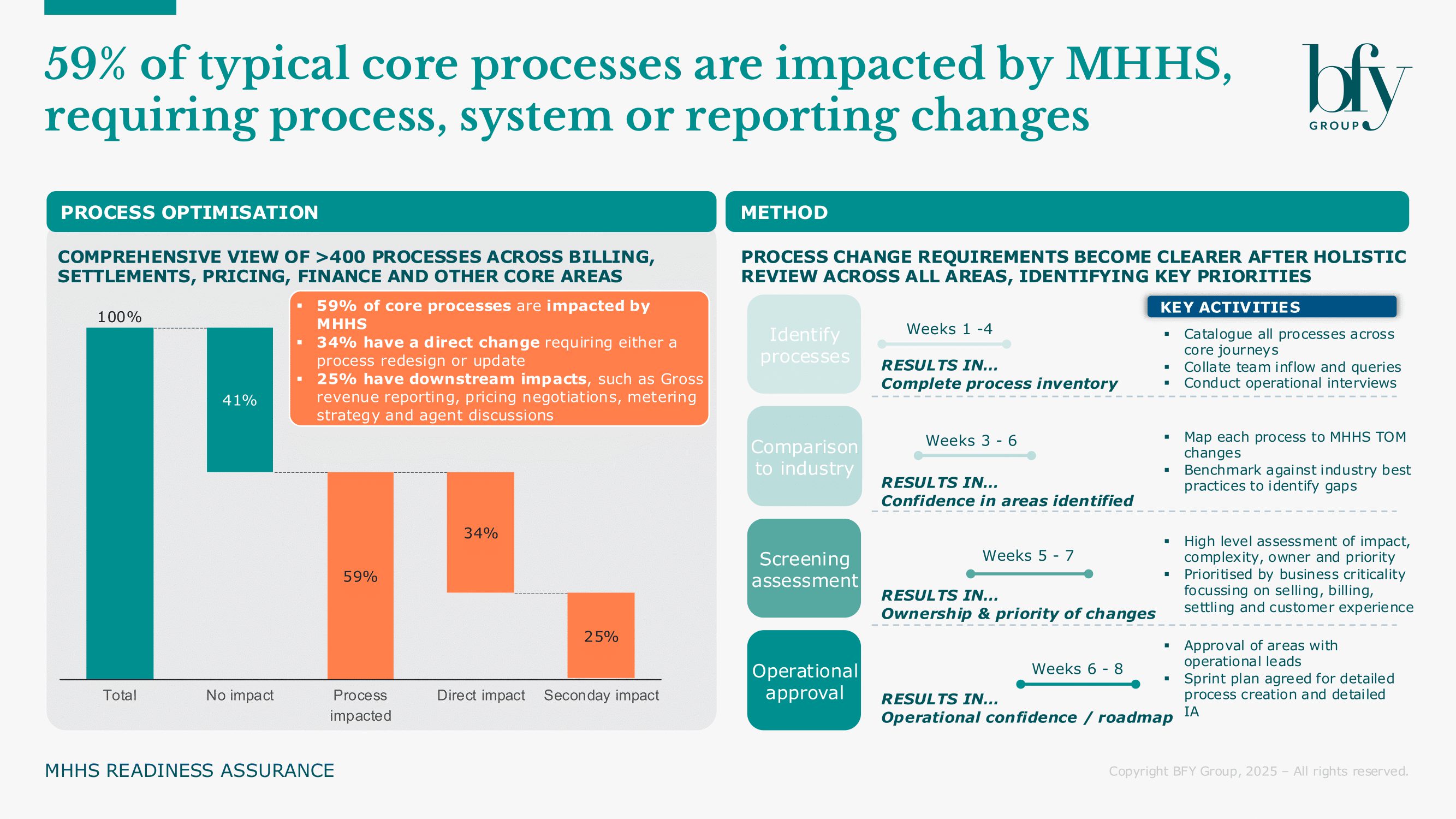With the migration phase for Market-wide Half Hourly Settlement (MHHS) underway, suppliers are now delivering one of the most significant market changes in decades, with the potential to transform customer engagement.
But as with any major reform, there’ll be operational hurdles along the way.
Based on our work supporting supplier MHHS readiness, we estimate that around 59% of core operational processes will be affected, with almost half posing a risk to successful migration if not addressed.
Below, we outline where direct process changes may be required, as well as where broader downstream impacts could affect revenue, pricing and strategy. We also highlight the opportunities to act early and get ahead.

MHHS is more than just a settlement or compliance change
MHHS is the largest transformation the energy industry has seen since privatisation.
It will impact over half of what everyone across your organisation does every day. Customer acquisition, compliance, third-party contracts, financial reconciliation and online operations, as well as billing and settlements. New rules, ways of working, complexity and plenty of new terminology.
It will affect every supplier, covering residential, SME and I&C customers, even if you already have a portfolio of large smart meter or half-hourly accounts.
How MHHS is impacting core processes
You may understand and be addressing the obvious risks – deadlines, data migration, linking to the Data Integration Platform. But are you aware and in control of the less obvious?
Primary impact requiring direct change
Process changes are likely to be required in ~30% of cases. The risk is operational and could undermine a successful migration. Technical delays, performance issues, increased cost and potential reputational failure.
Changes include:
- 150 existing data flow updates
- 79 data flows becoming obsolete
- 41 new interface flows
Secondary impact with downstream effects
For 25% of processes, there are less obvious technical and BAU changes, which carry higher short-term risk. These affect reporting, forecasting and decision-making. Consider financial reporting. You'll be dual-running systems for months, requiring two different settlement calculations and logic.
Similarly, if you rely on historic data messages and flows that are retiring, your reporting logic needs to change now.
Relevant technical impacts:
- Target Operating Model (TOM) changes, such as:
- Meter to bank (consumption data processing)
- Metering changes (MeX and energisation status)
- MPAN ownership (agent appointments and registrations)
Five questions to check you’re prepared
1) Do you view MHHS as a technical or compliance change?
If yes, you may be underestimating the scope. Examine your entire customer journey and see where the changes meet your current processes.
2) Do you know how many operational processes are different?
If not, now might be the time to assess the details, and check which areas have the largest impact and need your attention.
3) Do you know the impacts on your current and future automation strategy?
If not, you may find that existing automation routines fall over, suffer from an increased exception rate and require more effort to correct than expected.
4) Do you know what strategic opportunities MHHS presents?
If not, there are plenty of choices and opportunities available, so consider reviewing your approach.
5) Do you know what business critical reporting is impacted?
If not, you may find that financial reconciliations, accurate forecasting and operational performance may become time consuming and difficult to report on.
Seizing the opportunity
Forward-thinking suppliers are using MHHS as a springboard for broader transformation.
Opportunities to explore:
- Train staff for MHHS readiness
- Redesign your operating models to work seamlessly around the new data flows instead of just making do
- Automate processes that previously relied on manual intervention, enhancing service for customers and employees
- Design new products
- Develop new energy efficiency services to ‘beat the grid’
- Review and change supply partners to better reflect MHHS goals
If you want to use MHHS to build a stronger, more efficient operation, we can provide targeted recommendations with our MHHS readiness assessment.
We assess 156 different criteria across 5 key focus areas (process, people, partners, products and strategy). The results will help you understand the impact on your processes, and our targeted actions will turn MHHS preparation into a competitive advantage.
Get in touch with Kevin Scott or Jon Vincent to get started.




